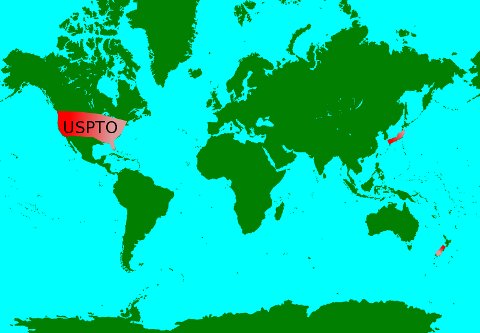

The software patents "red threat"
WHO is responsible for the latest travesty in New Zealand? Let's begin this from the top. People in New Zealand are not just outnumbered by sheep; they are also outweighed by drones from the United States based on the latest news. Here we have a video which was recently uploaded to YouTube. It hopefully sheds light on the situation which we covered many times this year.
Software patents, apparently on the way to being ruled out for New Zealand after a Select Committee decision on the Patents Bill, might not be completely excluded after all.
The committee earlier this year inserted a clause in the second-reading copy of the Bill [Section 15(3A)] reading simply “a computer program is not a patentable invention.”
On June 9 there was a meeting between Ministry of Economic Development (MED) officials and a delegation of local and international software companies led by Brett O’Riley of industry lobby NZICT Group.
“Many would welcome a comment on IBM's role in advocating for software patents in New Zealand.”
--Simon PhippsLater on he pointed out that "Big Multinationals will write software patent law in NZ" based on the quote which says: "our group will be working on developing this for submission"
Amazing.
So software patents are voted on not by people of New Zealand, who have no control over their laws, either. Simon Phipps has written to IBM's Bob Sutor, asking: "Many would welcome a comment on IBM's role in advocating for software patents in New Zealand. Can you help?"
Red Hat's Wildeboer, who used to lobby against software patents along with other software Freedom proponents, writes: "Somehow I already expect a giant rant from Florian Mueller on this"
Wildeboer is right. Müller already uses his Slashdot account (which he resumed using some months ago) to say: "Simon Phipps, former chief open source executive of Sun Microsystems, has just asked IBM's open source VP Bob Sutor via Twitter (with a reference to this very slashdot story) to clarify IBM's role in lobbying for software patents in New Zealand. It will be interesting to see Bob Sutor's response, should there ever be one.
"When it comes to patents, IBM stands for International Bullying Machines"
Here is the summary submitted to Slashdot by Ciaran:
ciaran_o_riordan writes "Due to lobbying by a group called NZICT, New Zealand's parliament is now set to let go of its proposal to ban software patents. Patent attorney Steven Lundberg announced the details in a blog entry. This was quickly deleted, but not before it got stored in Google's cache. Here we can read that 'Hon Simon Power has asked MED [Ministry of Economic Development] to work with the Parliamentary Counsel's Office to redraft the section along the lines of the European Patent Convention.' Which is exactly the opposite of March's announcement that 'computer software should be excluded from patent protection as software patents can stifle innovation and competition, and can be granted for trivial or existing techniques.' The background to this case gives every reason to be hopeful, if computer users in New Zealand get active again."
New Zealand looks like its reversing course on software patent protection. On June 9, there was a meeting between representatives of NZ Ministry of Economic Development (MED) and representatives of NZICT Group. It appears that New Zealand is likely to ultimately adopt an approach to software patents that is consistent with the EPO’s position. My thanks to Jim Hallenbeck (Schwegman) and Paik Saber (IBM) for relaying this information.
Here is the summary of the meeting provided by Brett O’Riley CEO of NZICT:
Our representative delegation met with MED in Wellington yesterday. This was to discuss the formal submission we had made to Hon Simon Power last week covering our concerns about the proposed draft legislation.
There was widespread happiness among software developers a few months back, when it was announced that New Zealand had decided to explicitly ban software patents. Of course, it didn't take long for a lobbying campaign to kick off from those opposed to this provision, and it appears the lobbying was effective, such that software patents will now be allowed -- though, they will still be somewhat limited (as they are in Europe). So, it's not quite as bad as the situation in the US. A New Zealand patent attorney posted a letter from the head of the lobbying group discussing this shift. While that blog post has since been deleted, as of this posting Google still has the cache.